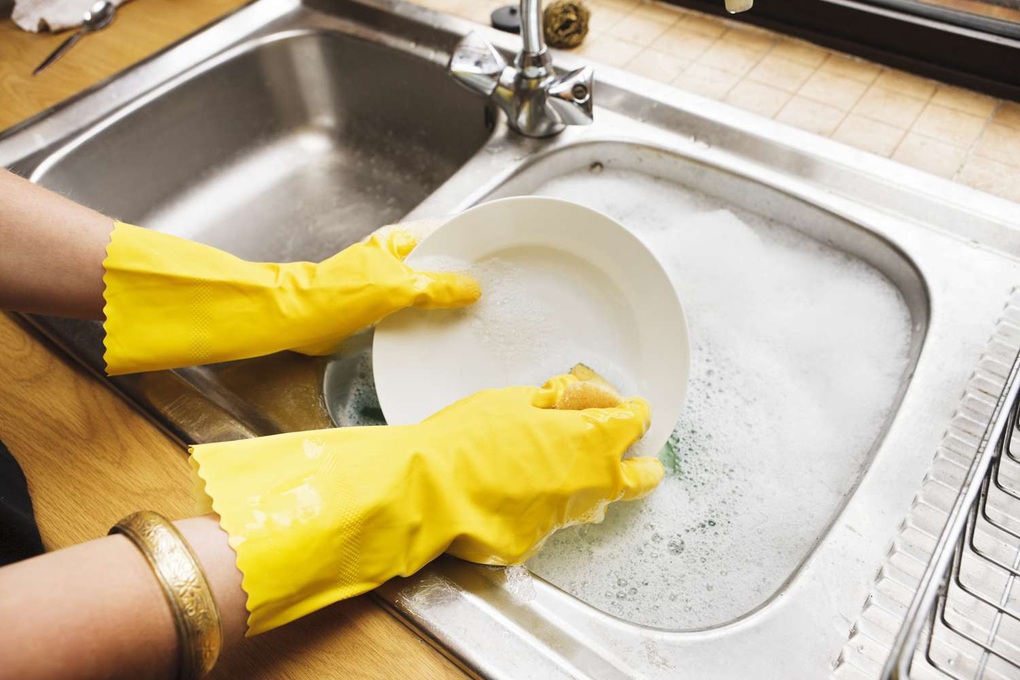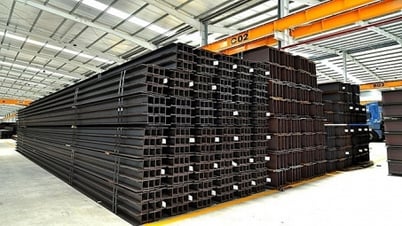According to research conducted in commercial kitchens, E. coli and other bacteria can survive on kitchen sponges for up to 16 days and microfiber towels for up to 13 days. Bacteria can also live and grow in dishwashers, especially if the machine is left wet for long periods of time.
But with good hygiene practices, you're less likely to get sick from harmful bacteria.
“If you wash your dishes with warm, soapy water and rinse them well, you’re doing a pretty good job,” says Janet Buffer, senior director of the Institute for Food Safety and Nutrition at George Washington University.

The kitchen space contains many bacteria that are harmful to health (Photo: Gettyimages).
Do you really need to disinfect kitchen utensils?
People often use the terms cleaning and sanitizing interchangeably, but they have different meanings in the food safety field.
Cleaning removes visible debris, such as leftover food. Scrubbing dishes with dish soap and hot water may not kill bacteria, but it will help remove some or all of them.
Sanitizing is an additional step after washing and rinsing. This step requires the use of very hot water or a chemical sanitizer to reduce the number of bacteria to safe levels. Dishwashers do this by using detergent and spraying hot water onto the dishes.
“Dishwashers are better at sanitizing because they can reach temperatures as high as 160 degrees Fahrenheit, while hand washing only reaches a maximum of 122 degrees Fahrenheit,” Larry Ciufo, senior testing project manager at Consumer Reports’ dishwasher lab, told Verywell .
Most dishwashers also have a sanitize cycle, which can remove 99.9% of soil bacteria in food, but you don't need to use this every day.
Once a month, run your dishwasher with just two cups of distilled white vinegar to help remove built-up residue. After the vinegar cycle, sprinkle in a cup of baking soda and run a hot water cycle to keep your dishes smelling fresh.
If you don't have a dishwasher, the best way to wash dishes is to use the two-sink method.
Specifically, fill a sink with hot water mixed with dish soap, and fill another sink (or a container) with cooler, clean water.
Remove any leftover food, scrub the dishes in the first sink, then rinse (rinse) the dishes in the second sink. For greasy pots and pans that are difficult to clean, you can soak them in hot water with salt to reduce the stickiness.
To disinfect without a dishwasher, you can use a chemical solution, but pay attention to the appropriate ratio. Soak the dishes in the solution for about two minutes before letting them dry naturally.
According to Melissa S. Wright, Director of the Food Production Technical Support Network at Virginia Tech (USA), because most dishes and utensils are non-porous, you do not necessarily need to sterilize these dishes after each use.
"If you use a plastic knife and cutting board to cut raw chicken, you should consider disinfecting the cutting board after each use and only using it to cut raw meat," says Wright.
Don't forget to clean the dishwasher.
Kitchen sponges have pores where bacteria can hide, so you should clean them regularly in the dishwasher or in a solution. You should also replace your sponge about once a week, but before you throw it away, use it to clean the inside of your dishwasher.
“Wipe down the inside of the machine to remove any debris, then run a sanitize cycle on the dishwasher,” says Wright.
You should also clean your sink after washing dishes or preparing raw foods. A recent study by the U.S. Department of Agriculture found that the kitchen sink was the most commonly contaminated surface after study participants prepared a meal that included raw sausage, eggs, and fruit.
Buffer suggests using a dish towel and dish soap to scrub the sink and reduce debris buildup. Cleaning the sink after washing dishes can be beneficial, especially if you just washed a cutting board that had raw produce on it.
If you want to dry your dishes, it is best to let them air dry instead of using a dish towel. Studies have found that dish towels and dishcloths in the home kitchen can harbor bacteria and have the potential to cross-contaminate or transfer bacteria to another source.
Also, when you put away dishes, make sure your hands are clean.
What does this mean for you?
You can clean and disinfect dishes effectively in the dishwasher or by hand. Most experts say you don't need to worry about cleaning dishes with chemical solutions because hot water and soap will effectively remove most bacteria.
Source: https://dantri.com.vn/suc-khoe/ban-da-biet-cach-rua-bat-dung-de-khong-gay-hai-suc-khoe-20250707112822876.htm































































































Comment (0)